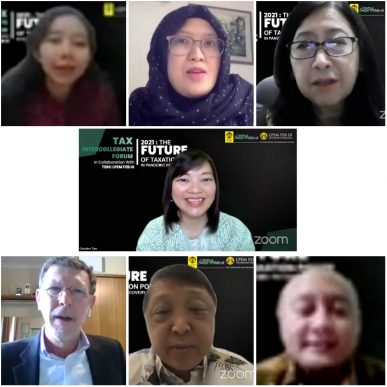TERC LPEM FEB UI and SPA: Tax Intercollegiate Forum Bahas 2021 – The Future of Taxation Policy in The Pandemic Recovery Era
Nino Eka Putra ~ PR of FEB UI
DEPOK – (21/10/2020) The Tax Education and Research Center, Institute for Economic and Community Research, Faculty of Economics and Business, Universitas Indonesia (TERC LPEM FEB UI) collaborated with the Accounting Professionalism Studies (SPA) to hold a Tax Intercollegiate Forum by webinar, on Wednesday ( 21/10/2020). The topic discussed was “2021: The Future of Taxation Policy in The Pandemic Recovery Era.” The event was opened by Dr. Ancella A. Hermawan, Chair of the Accounting Department of FEB UI and Riatu M. Qibthiyyah, Ph.D., Head of LPEM FEB UI.
The speakers in this webinar were Pande Putu Oka Kusumawardani, SE, MM, MPP, CA., Head of State Revenue Policy Center RI, B. Bawono Kristiaji, M.Sc., IBT., Partner at Danny Darussalam Tax Center, Prodjo Sunarjanto, SE, M.Ak., President Director of PT Adi Sarana Armada Tbk, and Prof. Rick Krever, A.M., Professor at School of Law University of Western Australia, moderated by Christine Tjen, S.E., Ak., M.Int.Tax, CA., Coordinator of TERC FEB UI.
Pande Putu, as the first resource person, explained that the Fiscal Policy Agency (BKF) of the Ministry of Finance prepared 7 tax policies for 2021, to accelerate the process of economic recovery and strengthen structural reforms. These policies, including taxation, continue to provide room for fiscal incentives for businesses, implement procedural and administrative relaxation policies, reform and improve tax regulations, and implement policies to optimize the expansion of the tax base. The expansion of the tax base is carried out by simplifying the administration and updating the core tax administration system, developing digital-based services for customs and excise matters, and the fiscal authorities adding more excisable goods.

“We are targeting tax revenue in 2021 of Rp1,444.5 trillion, down 2.5% from the original estimate of Rp1,481.9 trillion, while non-tax state revenue (PNBP) is now targeted at Rp. 298.2 trillion, up 1.6%. from the previous Rp 293.5 trillion. On the one hand, the customs and excise revenue target actually increased by 0.74%, from the original Rp205.7 trillion to Rp213.4 trillion.” Pande Putu explained.
B. Bawono Kristiaji, as the second speaker, said that tax stimulus and incentive policies were still on the agenda during the pandemic. Even so, a balance is needed between providing relaxation through incentives and the need to secure state revenues to support national economic recovery (PEN). The tax policy in the PEN phase faces several problems, namely low taxpayer compliance, low tax ratio, and large tax gap in terms of compliance and policy. This makes the tax revenue structure unbalanced, due to the large difference between the contribution of the business sector to GDP and the contribution in the form of tax revenue. In addition, there is still a large portion of the shadow economy, such as the informal sector and the emergence of non-standard types of work that have not been fully accommodated by the tax administration.

On the other hand, the policy instrument of the Job Creation Law is already in authoritarian hands as a tax cluster for legal certainty, increasing competitiveness, and encouraging ease of doing business. “Also, the tax reform policy with 5 main pillars to increase the tax base and reduce the tax gap, including organizational reform, human resources, technology and databases, business processes and regulations must be completed comprehensively. This aspect is important to increase the tax base and reduce the tax gap.” said Bawono.
Prodjo Sunarjanto, as the third resource person, explained that players or the business world will still focus on keeping the core business running next year. In line with the process of restoring business activities, the business world has an expectation scheme aimed at the government to simplify the tax system by relying on technology and new innovations to reduce costs.

According to Prodjo, to increase the level of public consumption, the government must reorganize the income tax layer structure or tax bracket. In addition, there is a tax incentive policy, especially for the logistics sector. Basically, logistics costs in Indonesia are around 23% of GDP and if this can be suppressed with tax incentives it will certainly increase competitiveness. Meanwhile, the collection of local taxes, such as land and building tax (PBB) needs to be reviewed, because it is a burden to business players, as well as reducing Indonesia’s competitiveness.
Rick Krever, as the fourth resource person, said that many countries use tax policy instruments to support businesses to survive during the pandemic by providing tax incentives that must be managed in a balanced manner. The three most popular types of taxes to provide relaxation include value added tax (VAT), Personal income tax (PPh), and Corporate Income Tax.

In closing, Rick Krever said that, “For quick liquidity, many countries are expanding the incentives for compensation for losses, both carry-over for the next tax year, as well as carry-back losses. Carry back for losses is mostly given to companies that need cash flow quickly. Indonesia does not implement this policy, but Singapore, New Zealand, Australia and many other countries impose these incentives.”. (hjtp)
(am)









